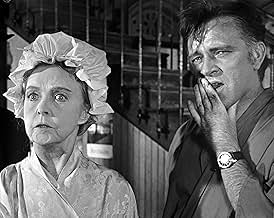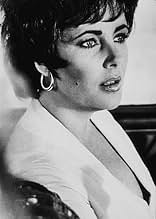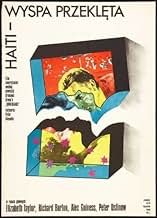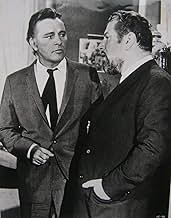VALUTAZIONE IMDb
6,2/10
2398
LA TUA VALUTAZIONE
Aggiungi una trama nella tua linguaA cynical Welsh hotel owner secretly romances a diplomat's wife in Haiti, under the violent reign of the despot "Papa Doc" Duvalier.A cynical Welsh hotel owner secretly romances a diplomat's wife in Haiti, under the violent reign of the despot "Papa Doc" Duvalier.A cynical Welsh hotel owner secretly romances a diplomat's wife in Haiti, under the violent reign of the despot "Papa Doc" Duvalier.
- Premi
- 3 vittorie e 1 candidatura in totale
Thomas Baptiste
- Haitian Soldier
- (non citato nei titoli originali)
Make Bray
- Haitian Soldier
- (non citato nei titoli originali)
Robin Langford
- Angelito Pineda
- (non citato nei titoli originali)
Dennis Alaba Peters
- César
- (non citato nei titoli originali)
Recensioni in evidenza
I haven't read Graham Greene's novel on which this movie is based. But, "The Comedians" on film is laboriously long and drawn out. Except for the first-rate cast of big cinema names of the time, it wouldn't have held my interest all the way through. The fact that the setting is Haiti during the reign of one of the worst despots of the 20th century, François (Papa Doc) Duvalier, only adds to one's uneasiness in watching this movie.
The great storyteller that he was, Graham Greene must have woven the elements of this story together very well in his novel. But here we have two big separate stories butting heads with one another. The first is the adulterous love affair between the two leads, Richard Burton as Brown and Elizabeth Taylor as Martha. The second is the plight of the people of Haiti living in a constant state of terror under the ruthless Duvalier and his henchmen. But then, two other elements that Greene no doubt worked into his single story, here appear to be separate stories awkwardly sandwiched into the two main stories. They are the businesses of Major Jones, played by Alec Guinness, and of Smith, played by Paul Ford. The end result is a plot with many subplots – all poorly connected.
Besides the leads, the film has several stellar actors. Guinness and Ford are joined by Peter Ustinov as Ambassador Pineda, Lillian Gish as Mrs. Smith, and James Earl Jones as Dr. Magiot. A handful of others in the supporting cast also give good performances in the film.
The direction and editing are weak. The cinematography is good and the location does a good job showing the scenery and conditions as they might have been in Haiti from the late 1950s through most of the 20th century. But for that historical connection and the performances of the supporting cast, this film is hardly worth watching. At the end of the movie, it seemed to me that I had been watching a belabored story about a sex-driven but frustrated white hotel owner in Haiti who couldn't find fulfillment in anything he did.
Movie fans who enjoy history may find Duvalier's story interesting. He was a physician who treated the poor and suffering people of Haiti in his early life. That's where he got his endearing moniker from the people, "Papa Doc." He was elected president in a free open election in 1957. But he soon became crazed with power. He killed 30,000 of his countrymen and established a reign of fear and terror, while the poor of his country suffered all the more.
The great storyteller that he was, Graham Greene must have woven the elements of this story together very well in his novel. But here we have two big separate stories butting heads with one another. The first is the adulterous love affair between the two leads, Richard Burton as Brown and Elizabeth Taylor as Martha. The second is the plight of the people of Haiti living in a constant state of terror under the ruthless Duvalier and his henchmen. But then, two other elements that Greene no doubt worked into his single story, here appear to be separate stories awkwardly sandwiched into the two main stories. They are the businesses of Major Jones, played by Alec Guinness, and of Smith, played by Paul Ford. The end result is a plot with many subplots – all poorly connected.
Besides the leads, the film has several stellar actors. Guinness and Ford are joined by Peter Ustinov as Ambassador Pineda, Lillian Gish as Mrs. Smith, and James Earl Jones as Dr. Magiot. A handful of others in the supporting cast also give good performances in the film.
The direction and editing are weak. The cinematography is good and the location does a good job showing the scenery and conditions as they might have been in Haiti from the late 1950s through most of the 20th century. But for that historical connection and the performances of the supporting cast, this film is hardly worth watching. At the end of the movie, it seemed to me that I had been watching a belabored story about a sex-driven but frustrated white hotel owner in Haiti who couldn't find fulfillment in anything he did.
Movie fans who enjoy history may find Duvalier's story interesting. He was a physician who treated the poor and suffering people of Haiti in his early life. That's where he got his endearing moniker from the people, "Papa Doc." He was elected president in a free open election in 1957. But he soon became crazed with power. He killed 30,000 of his countrymen and established a reign of fear and terror, while the poor of his country suffered all the more.
When I bought "The Comedians" in DVD, I had never heard before of that movie, although I am a fan of the cinema of the specific era. Moreover, it surprised me I didn't know anything about a film with such an excellent cast: it isn't easy to find Burton, Taylor, Guinness, Ustinov, Gish and Ford in the same movie. And there was something else: it was based on a novel and written for the screen by an author whose work I admire: Graham Greene. Therefore, I was curious to find out why a movie with so many virtues flopped and was so soon forgotten. After watching it, I understood: "The Comedians" is a movie that was made for the general audience, a film that should be fun, fast and easy to digest, a typical Hollywood epic. However, it contains none of the classic ingredients: a) it isn't fun, it is a serious political drama, with a deeply British, cynical and black humour, b) it is not melodramatic enough and the love story between Burton and Taylor evolves quite unorthodoxically, without any clichés, c) it isn't fast at all, it's almost three hours without impressive action scenes and much - quite sophisticated - dialogue, d) it isn't easy to digest, it is a sad and bitter movie with an ambiguous ending. These are the reasons why "The Comedians" flopped, but they are also the reasons that make the film exceptionally interesting. Set in Tahiti during the dictatorship of Francois Duvalier ("Papa Doc"), an ideal location for Graham Greene's stories, it demonstrates the cruelty of the regime, through the story of 6 Westerners and some locals in the background. It is a big, flawless production providing food for thought accompanied by excellent cinematography, professional directing and a slow, but strong and memorable scenario. The claustrophobic atmosphere of the brutal dictatorship is exceptional, the actors give magnificent performances and it is also one of the few films that end without an answer, without a typical happy or tragic ending. I recommend it to viewers that enjoy films that provide more than a pleasant evening.
The Comedians one of the many films that starred that legendary screen team of the 60s, husband and wife Richard Burton and Elizabeth Taylor is set in that troubled stepchild of the western hemisphere Haiti. At the time Haiti was mired in the worst poverty on this side of the globe with the overwhelmingly brutal dictatorship of Papa Doc Duvalier. Duvalier and his family are gone now, but the brutality and poverty remain.
The title from the original Graham Greene novel refers to the various white people here who are very different, but who handle what they see in Haiti by making a lot of bad jokes. Whatever else this is, The Comedians is not a comedy.
Burton and Taylor play the owner of a hotel in Port-Au-Prince and she is the wife of an ambassador from some foreign country unnamed. They're having an affair, she's married to Peter Ustinov. Paul Ford and Lillian Gish are a husband and wife and he once ran for president on the Vegetarian Party ticket. He wants to start a business, a vegetarian resort of sorts. These two are totally clueless, but so are the Haitians they deal with, they actually treat Ford like a big deal.
Alec Guinness plays a part similar to the part David Niven had in Separate Tables, he's an arms dealer who's been dealing with someone now out of favor with the regime. But while at first he's clapped in prison Guinness makes a deal with another faction who think he's a big deal with his heralded background of being a war hero in the Burmese campaign in World War II. If you've seen Separate Tables than you can equate Guinness with Niven.
These name players however take a back seat to some of the black performers in The Comedians. Roscoe Lee Browne, Cicely Tyson, Gloria Foster, Georg Stanford Brown all are different types of Haitians from different levels of society there. But the guy to really watch is Raymond St. Jacques. As a captain in Duvalier's police he is one truly malevolent being. St. Jacques steals all the scenes he's in.
Of course Papa Doc didn't allow The Comedians to be shot in Haiti, but the country of Dahomey one of the new African Republics served well as a place with a poverty level similar to Papa Doc's little satrapy. The Comedians which was not a big hit at the time is maybe more relevant today as we can see things there without the filter of the Cold War between two superpowers.
Liz and Dick did a good one here, one for the ages.
The title from the original Graham Greene novel refers to the various white people here who are very different, but who handle what they see in Haiti by making a lot of bad jokes. Whatever else this is, The Comedians is not a comedy.
Burton and Taylor play the owner of a hotel in Port-Au-Prince and she is the wife of an ambassador from some foreign country unnamed. They're having an affair, she's married to Peter Ustinov. Paul Ford and Lillian Gish are a husband and wife and he once ran for president on the Vegetarian Party ticket. He wants to start a business, a vegetarian resort of sorts. These two are totally clueless, but so are the Haitians they deal with, they actually treat Ford like a big deal.
Alec Guinness plays a part similar to the part David Niven had in Separate Tables, he's an arms dealer who's been dealing with someone now out of favor with the regime. But while at first he's clapped in prison Guinness makes a deal with another faction who think he's a big deal with his heralded background of being a war hero in the Burmese campaign in World War II. If you've seen Separate Tables than you can equate Guinness with Niven.
These name players however take a back seat to some of the black performers in The Comedians. Roscoe Lee Browne, Cicely Tyson, Gloria Foster, Georg Stanford Brown all are different types of Haitians from different levels of society there. But the guy to really watch is Raymond St. Jacques. As a captain in Duvalier's police he is one truly malevolent being. St. Jacques steals all the scenes he's in.
Of course Papa Doc didn't allow The Comedians to be shot in Haiti, but the country of Dahomey one of the new African Republics served well as a place with a poverty level similar to Papa Doc's little satrapy. The Comedians which was not a big hit at the time is maybe more relevant today as we can see things there without the filter of the Cold War between two superpowers.
Liz and Dick did a good one here, one for the ages.
After delighting audiences in director Franco Zeffirelli's 1967 hit adaptation of Shakespeare's THE TAMING OF THE SHREW, the Burtons' popularity with audiences seemed to be on the wane as their next film, Peter Glenville's THE COMEDIANS (1967) became their first full-fledged box office disappointment. There was much publicity surrounding the political thriller as it shot in Africa (masquerading as Haiti) and the fact that Taylor accepted half her usual salary and took second billing behind Burton kept gossips wagging for months (she reportedly only took the part out of fear of being replaced with Sophia Loren). But when the film opened, critics found it slow and talky and audiences simply seemed uninterested. Although the film is never quite as interesting or as suspenseful as it could have been, I dare say that THE COMEDIANS probably plays a great deal better today without the heavy expectations of the time surrounding it.
Graham Greene does a respectable job of paring down his complex novel for the screen, and director Glenville keeps the film moving at a reasonable pace in spite of its lengthy runtime of 150 minutes. The film is always interesting and occasionally gripping, although Greene and Glenville keep the audience at a relative distance which prevents the picture from striking as hard as it could have. Burton is in good form, and Alec Guinness, Paul Ford, and Lillian Gish all turn in top notch support (only Peter Ustinov feels under utilized). Unfortunately, Taylor is dreadfully miscast as a German military wife complete with a woefully unconvincing accent and her ill-fitting presence creates several lulls in the film as the number of scenes between her character and Burton's character are increased (in order to give the diva her proper screen time) which hampers a few long stretches of the film and slightly undermines what could have been a first-rate effort.
Graham Greene does a respectable job of paring down his complex novel for the screen, and director Glenville keeps the film moving at a reasonable pace in spite of its lengthy runtime of 150 minutes. The film is always interesting and occasionally gripping, although Greene and Glenville keep the audience at a relative distance which prevents the picture from striking as hard as it could have. Burton is in good form, and Alec Guinness, Paul Ford, and Lillian Gish all turn in top notch support (only Peter Ustinov feels under utilized). Unfortunately, Taylor is dreadfully miscast as a German military wife complete with a woefully unconvincing accent and her ill-fitting presence creates several lulls in the film as the number of scenes between her character and Burton's character are increased (in order to give the diva her proper screen time) which hampers a few long stretches of the film and slightly undermines what could have been a first-rate effort.
This had all the making of a first rate political drama. There is an acclaimed novelist whose novel this was adapted from, an exciting premise (British expatriates in Haiti, brutally ruled by the brutal and eccentric "Papa Doc" Duvliar's, get caught up in political oppression and rebellion), an star-studded ensemble cast, and exotic locations. So why does it fall so flat? Part of the problem is that it the film is overlong, lasting for around two and a half hours. The result is a story which moves very slowly with a lot of excess chat. Also, there is too much emphasis on the dreary soap opera love triangle of the three main characters (Richard Burton, Elizabeth Taylor, and Peter Ustinov). The Burton character, a cynical hotel owner of British decent, is obviously copied on the Humphrey Bogard character in "Cassablanca." The film also fails to take advantage of the official oppression and corruption which is the cause of the country's problems. There is little sense of danger until the last half hour, and even then the action is sporadic. There is also a failure to take advantage of the locations. The film was shot in Benin, an African country which isn't a convincing substitute for Haiti, though there was obviously no way this could have been shot in Haiti itself. But the photography is pretty ordinary. There are a few good scenes, including a voodoo ceremony and a shootout in a cemetery. Also, some supporting characters are actually rather interesting, helped by fine performances by James Earl Jones as a surgeon who supports the rebels and Raymond St. Jacques as a sinister police commander who tortures and murders people as casually as most people would order a take-out lunch. Unfortunately, but most of the film is a case of missed opportunities. It's passable, but overlong and never worthy of the talent that went into it.
Lo sapevi?
- QuizSeveral critics noted that the ending of this movie is at least a little more positive and optimistic than the bleak ending of Graham Greene's original novel, and attacked the movie for "softening" the subject. Graham Greene, however, insisted that the more upbeat ending had been his own idea.
- BlooperIn the last few shots in the movie, as the Character is leaving the airport, there is initially a departing Vickers VC10 airliner flying overhead from right to left, this changes to a close up, followed by a shot of the same airliner now flying into the distance - unfortunately this is different 4 engine Jetliner, probably a Boeing 707.
- Citazioni
Brown: I don't believe in causes.
Dr. Magiot: The role of cynic doesn't really suit you, Brown.
Brown: I don't believe in play-acting either.
Dr. Magiot: You imagine because you've lost one faith, you've lost all? You're wrong, Brown. There is always an alternative to the faith we lose.
Brown: I have no faith in faith.
- ConnessioniFeatured in The Comedians in Africa (1967)
I più visti
Accedi per valutare e creare un elenco di titoli salvati per ottenere consigli personalizzati
- How long is The Comedians?Powered by Alexa
Dettagli
Botteghino
- Lordo Stati Uniti e Canada
- 5.200.000 USD
- Tempo di esecuzione
- 2h 30min(150 min)
- Mix di suoni
- Proporzioni
- 2.35 : 1
Contribuisci a questa pagina
Suggerisci una modifica o aggiungi i contenuti mancanti



































